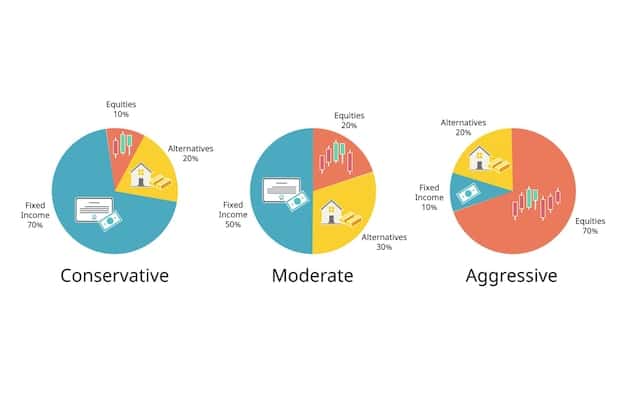Freelancer Budgeting in 2025: 7 Tips for Income Stability

Budgeting for freelancers in 2025 requires a strategic approach to manage income fluctuations, encompassing meticulous expense tracking, diversified income streams, dedicated savings, tax planning, and leveraging budgeting tools for financial stability and growth.
Budgeting for freelancers: 7 Essential Tips for Managing Income Fluctuations in 2025 is crucial for financial stability. The unpredictable nature of freelance income requires a proactive and strategic approach to ensure you can cover your expenses, save for the future, and navigate the complexities of self-employment taxes, setting you up for success in the coming year.
Mastering Freelancer Budgeting in 2025: Why It’s More Critical Than Ever
The freelance economy continues to grow, but so does the competition and the challenges of managing an unsteady income. Budgeting for freelancers is no longer a luxury; it’s a necessity for surviving and thriving in 2025.
With economic uncertainties and evolving market trends, having a solid budget is the cornerstone of a successful freelance career.

Knowing Your Numbers: Tracking Income and Expenses
Before you can create a budget, you need to understand where your money is coming from and going to. Accurate tracking of income and expenses is the first step in budgeting for freelancers.
This involves meticulously recording every dollar earned and spent, categorizing your expenses to gain insights into your spending habits.
Why Track Every Expense?
Tracking your expenses provides a clear picture of your financial health. Here’s why it’s essential:
- Identify Spending Patterns: You can see where your money is actually going, revealing potential areas for cuts.
- Accurate Tax Reporting: Keeping detailed records simplifies tax season and ensures you claim all eligible deductions.
- Budgeting Accuracy: Real data on your income and expenses leads to a more realistic and effective budget.
Implement a system for this, whether it’s a spreadsheet, budgeting app, or accounting software. Consistency is key.
Creating Realistic Income Projections
Predicting your income as a freelancer can be tricky, but it’s crucial for effective budgeting for freelancers. Instead of relying on wishful thinking, create realistic income projections based on past performance and current market conditions.
Analyze your previous year’s income, identify trends, and factor in any anticipated changes in your workload or rates.
Strategies for Income Forecasting
Here are some tactics to help you create more reliable income projections:
- Average Monthly Income: Calculate your average monthly income over the past year. This provides a baseline for future projections.
- Seasonal Adjustments: Account for seasonal fluctuations in your industry. Some months may be busier than others.
- Pipeline Analysis: Evaluate your current projects and potential opportunities. Estimate the income they’ll generate.
This approach provides a realistic view of your potential earnings, upon which you can build a stronger budget.
The 50/30/20 Rule: A Simple Budgeting Framework
The 50/30/20 rule is a popular budgeting framework applicable to freelancers. It simplifies the budgeting process by allocating your income into three categories: needs, wants, and savings/debt repayment. This approach can be a useful tool in budgeting for freelancers because of its flexibility.
This method ensures that your essential expenses are covered, while also allowing for enjoyment and future security.
Applying the 50/30/20 Rule
Here’s how to implement this rule effectively:
- 50% for Needs: Allocate 50% of your income to essential expenses such as rent, utilities, groceries, transportation, and healthcare.
- 30% for Wants: Dedicate 30% to discretionary spending, including dining out, entertainment, hobbies, and non-essential shopping.
- 20% for Savings/Debt Repayment: Use 20% for savings goals, emergency funds, and paying off debt, such as credit card balances or student loans.
Regularly review and adjust your budget to stay aligned with your financial goals and changing circumstances.

Building an Emergency Fund: Your Financial Safety Net
As a freelancer, consistent income is not always guaranteed. Building an emergency fund is a critical aspect of budgeting for freelancers, serving as a financial safety net during lean periods.
This fund should cover at least 3-6 months’ worth of living expenses, providing a cushion to weather unexpected income fluctuations.
Steps to Create Your Emergency Fund
Here’s how to build your emergency fund:
- Set a Goal: Determine the amount you need to cover 3-6 months of essential expenses.
- Automate Savings: Set up automatic transfers from your checking account to a dedicated savings account each month.
- Adjust Contributions: Increase your contributions during high-income months to accelerate your savings.
Tax Planning: Preparing for Self-Employment Taxes
One of the biggest financial challenges for freelancers is managing self-employment taxes. Unlike traditional employees, freelancers are responsible for paying both the employer and employee portions of Social Security and Medicare taxes. Effective tax planning is an essential component of budgeting for freelancers and can prevent significant financial strain.
Start by understanding your tax obligations and setting aside enough money to cover them when they come due.
Strategies for Tax Planning
Consider these strategies for effective tax planning:
- Estimate Quarterly Taxes: Calculate and pay your estimated taxes quarterly to avoid penalties and interest.
- Track Deductible Expenses: Keep detailed records of all business-related expenses, as they may be tax-deductible.
- Consult a Tax Professional: Seek guidance from a tax advisor to navigate complex tax laws and optimize your tax strategy.
By prioritizing tax planning, you can prevent unwanted surprises and ensure financial stability.
Investing in Your Business: Marketing and Professional Development
As a freelancer, you are your business. Investing in your business through marketing and professional development is crucial for long-term success. While it may seem counterintuitive to spend money, these investments can yield significant returns. Integrating these costs in budgeting for freelancers is vital.
Allocate a portion of your budget to activities that will expand your client base, increase your earning potential, and keep you competitive in your industry.
Areas to Invest In
Here are some areas to consider investing in:
- Marketing: Allocate funds for website development, social media advertising, content creation, and networking events.
- Professional Development: Invest in courses, workshops, and conferences to enhance your skills and knowledge.
- Tools and Technology: Purchase software, equipment, and online tools that can improve your productivity and efficiency.
Prioritizing these investments can help you grow your business and achieve your financial goals, ensure future financial success.
Leveraging Budgeting Tools and Apps
In today’s digital age, numerous budgeting tools and apps are specifically designed to help freelancers manage their finances effectively. Leveraging these tools can simplify the budgeting process and provide real-time insights into your financial performance. Modern approaches to
budgeting for freelancers often emphasize the use of technology to provide precise data and control.
Explore different options and choose the ones that align with your needs and preferences.
Popular Budgeting Apps
Consider these budgeting apps to streamline your financial management:
- Mint: A free app that tracks your spending, creates budgets, and provides insights into your financial habits.
- YNAB (You Need a Budget): A comprehensive budgeting app that helps you allocate every dollar to a specific purpose.
- QuickBooks Self-Employed: An accounting software designed for freelancers to track income, expenses, and taxes.
By leveraging these tools, you can automate many aspects of budgeting and gain a clearer understanding of your finances.
| Key Point | Brief Description |
|---|---|
| 📊 Track Income & Expenses | Record everything to understand where your money goes. |
| 💰 Realistic Income Projections | Base forecasts on past data, adjusting for market changes. |
| 🛡️ Emergency Fund | Save 3-6 months of expenses for financial security. |
| 💸 Tax Planning | Prepare for self-employment taxes by estimating and saving quarterly. |
Frequently Asked Questions
▼
Use budgeting apps, spreadsheets, or accounting software to record all income and expenses. Separate business and personal finances and regularly reconcile your accounts to ensure accuracy.
▼
Review past income data to identify trends. Consider your current pipeline of projects, factor in seasonal changes, and adjust based on economic or industry forecasts for a realistic projection.
▼
Aim to save at least 3-6 months’ worth of essential living expenses. This fund will help you cover unexpected costs and income gaps, giving you peace of mind during uncertain times.
▼
Estimate your quarterly taxes and pay them on time. Track all deductible business expenses, and consult with a tax professional to ensure you are taking advantage of all available deductions and credits.
▼
Consider using Mint for expense tracking, YNAB for detailed budgeting, or QuickBooks Self-Employed for accounting and tax preparation. Choose a tool that aligns with your specific needs and financial goals.
Conclusion
Budgeting for freelancers is a continuous process that requires discipline, adaptability, and a willingness to learn. By implementing these seven essential tips, you’ll be well-equipped to manage income fluctuations, achieve financial stability, and build a successful freelance career in 2025 and beyond.




